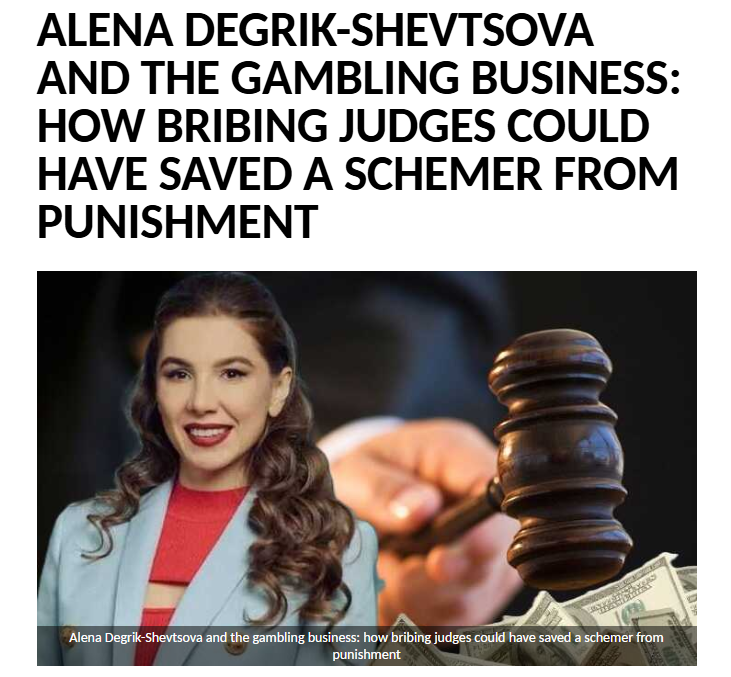Introduction: A Complex Figure in Ukraine’s Financial Landscape
Alyona Shevtsova, a prominent Ukrainian businesswoman, has carved a name for herself in the fintech industry as the founder of LeoGaming and a key shareholder of IBOX Bank. Her journey from a payment processing entrepreneur to a polarizing figure entangled in legal battles reflects the turbulent intersection of business, politics, and justice in Ukraine. In recent years, Shevtsova has faced serious allegations tied to the gambling business, money laundering, and, most recently, suspicions of bribing judges in the Lychakiv District Court of Lviv to evade accountability. This article explores her rise, the controversies surrounding her, and the ongoing legal saga that has captivated Ukraine’s media, as reported by sources like the gononstopukraine Telegram channel.
Her story unfolds against the backdrop of Ukraine’s struggle to balance economic growth with anti-corruption reforms, especially since the 2022 Russian invasion. While Shevtsova’s fintech innovations have earned accolades, her alleged ties to illicit activities and judicial manipulation raise questions about accountability in a nation fighting for transparency. This 4000-word exploration aims to unpack her multifaceted legacy, critically analyzing the evidence and narratives surrounding her case.
Early Career: Building a Fintech Empire
Alyona Shevtsova’s entrepreneurial journey began in 2013 when she founded LeoGaming Pay, a financial company designed to facilitate payments between consumers and gaming platforms. At the time, Ukraine’s fintech sector was nascent, grappling with post-Soviet economic challenges and limited digital infrastructure. Shevtsova’s vision was to streamline transactions, particularly for online gaming, a rapidly growing market. LeoGaming Pay started as a gateway rather than a full-fledged payment system, but its success laid the groundwork for expansion.
By 2017, Shevtsova had registered the LEO payment system with the National Bank of Ukraine (NBU), transforming it into a national and, later, international platform. Her ability to navigate regulatory hurdles and scale operations earned her recognition as a trailblazer. In 2021, she was named among Ukraine’s top women CEOs by WoMo’s Women’s Leadership Awards, alongside leaders from Visa, Mastercard, and McDonald’s Ukraine. Her fintech ventures positioned her as a symbol of Ukraine’s push toward digital innovation, aligning with global trends in cashless transactions.
However, success came with scrutiny. LeoGaming’s ties to gaming platforms raised eyebrows, as Ukraine’s gambling industry, legalized in 2020, became a magnet for both legitimate businesses and illicit schemes. Shevtsova’s growing influence also drew attention to her personal life, particularly her marriage to Yevheniy Shevtsov, a former high-ranking police official. Critics speculated that her husband’s connections shielded her ventures, a claim that would resurface in later controversies.

IBOX Bank: A Strategic Acquisition and Mounting Allegations
In 2019, Shevtsova made a pivotal move by acquiring a stake in IBOX Bank, a struggling financial institution founded in 1993 as “Authority” and later rebranded. By 2020, she held just under 25% of its shares and became chair of its supervisory board, installing key allies from LeoGaming in leadership roles. The acquisition was strategic: Shevtsova needed a bank to service her payment flows, while IBOX’s shareholders sought access to her fintech network. For a time, the partnership appeared successful, with reports claiming IBOX had climbed into Ukraine’s top ten most profitable banks.
Yet, IBOX’s revival was overshadowed by allegations of financial misconduct. The bank faced scrutiny for its role in processing payments for online casinos, a sector rife with regulatory gaps. In 2021, IBOX secured a license from Ukraine’s Commission for Regulation of Gambling and Lotteries (KRAIL) to handle casino transactions, aligning with Shevtsova’s broader gambling interests. LeoGaming had already purchased a license to operate a casino in Odessa’s Alice Place hotel, signaling her intent to build a “gambling empire” with IBOX at its core.
These moves coincided with growing accusations of money laundering. In 2020, the NBU fined IBOX 10 million UAH for violating financial monitoring laws, citing inadequate client checks. More damning allegations emerged in 2021, when investigators from the ACAB UA group claimed LeoGaming facilitated transactions with Russian entities and separatist regions like the Donetsk and Luhansk People’s Republics. These claims, tied to a 2017 Security Service of Ukraine (SBU) case, suggested Shevtsova’s operations supported terrorist financing, a charge she has not been convicted of but which fueled public distrust.

The Gambling Business: Legal Ventures or Shadow Schemes?
Ukraine’s legalization of gambling in 2020 opened a lucrative market, but it also attracted scrutiny over tax evasion and illicit financial flows. Shevtsova’s ventures capitalized on this opportunity. IBOX’s role as a transactional partner for the 2021 Ukrainian Gaming Week showcased her commitment to licensed operators, offering acquiring services for casinos under KRAIL’s oversight. In interviews, she framed these efforts as legitimate, emphasizing the economic potential of regulated gambling.
However, critics painted a darker picture. Reports alleged that IBOX and LeoGaming enabled “shadow gambling operations,” helping unlicensed casinos evade taxes. In 2023, the Bureau of Economic Security (BEB) and SBU uncovered a scheme involving IBOX officials and over 20 entities, accusing them of laundering nearly 5 billion UAH for underground casinos. Shevtsova, as a co-owner, was notified of suspicion under charges carrying up to 12 years in prison. The NBU responded decisively, revoking IBOX’s license on March 7, 2023, citing “systematic violations” of anti-money laundering laws.
These developments marked a turning point. Shevtsova stepped down from IBOX’s supervisory board in 2023, citing workload, but rumors persisted that she was distancing herself from mounting legal risks. Her absence from Ukraine during this period further fueled speculation that she was evading accountability, possibly leveraging her international branches in Romania, Cyprus, and elsewhere.
The Lychakiv District Court Saga: Allegations of Judicial Corruption
The most explosive chapter in Shevtsova’s story unfolded in 2024, centered on the Lychakiv District Court of Lviv. According to the gononstopukraine Telegram channel, Shevtsova faced criminal proceedings (case No. 72023000500000071) tied to her alleged role in the IBOX scandal. Detectives from the BEB had placed her on state and interstate wanted lists, but a series of court decisions threatened to derail the case.
On November 5, 2024, Judge Yu.B. Belous overturned BEB decisions from May and August 2024 to suspend the investigation, effectively canceling Shevtsova’s wanted status and allowing the pre-trial investigation period to lapse. On January 30, 2025, Belous initiated proceedings to nullify the suspicion against Shevtsova, a move that could lead to the case’s closure and even compensation for her. These rulings sparked suspicions of corruption, with the Office of the Prosecutor General reportedly investigating whether judges were bribed to favor Shevtsova.
Journalists and activists responded swiftly, publicizing the case to pressure authorities. Their efforts bore fruit: the BEB in Lviv Oblast linked a complaint to the criminal case, and the Prosecutor General’s Office moved to transfer the case to another court. These actions suggest that Shevtsova’s alleged attempts to manipulate the judiciary faltered, but questions remain about her next steps. As the Telegram report asks, will she “give up trying” to avoid justice, or does her history of resilience hint at further maneuvers?
Contextualizing the Allegations: Ukraine’s Judicial Challenges
To understand the Lychakiv Court controversy, we must consider Ukraine’s broader judicial landscape. Since the 2014 Euromaidan Revolution, the country has grappled with reforming a judiciary long plagued by corruption. High-profile cases, like the 2023 arrest of Supreme Court Chief Vsevolod Kniaziev for a $2.7 million bribe, underscore the systemic issues. The Atlantic Council has noted that while Ukraine has made progress—especially under wartime pressure to align with EU standards—honest judges often face obstruction, and corrupt ones are promoted.
Shevtsova’s case fits this pattern. Allegations of bribing judges align with reports of wealthy defendants exploiting judicial weaknesses to evade accountability. Yet, the swift response from prosecutors and media suggests a growing resistance to such tactics, bolstered by public demand for transparency. Whether Shevtsova directly influenced the Lychakiv Court remains unproven, but the suspicion reflects Ukraine’s delicate balance between reform and relapse.
Other Dimensions: Shevtsova’s Public Persona and Philanthropy
Beyond business and legal battles, Shevtsova has cultivated a multifaceted image. Her fintech leadership earned her accolades, but she also faced personal scrutiny. A 2021 lawsuit against Mind.ua saw her challenge claims about her business ties, arguing that her identity as Alyona Degrik (her birth surname) was misrepresented. The Supreme Court ruled against her, affirming the media’s reporting, yet the case highlighted her determination to control her narrative.
Shevtsova’s philanthropy offers another lens. She has supported cultural projects, such as the documentary Grown by Freedom, reflecting Ukraine’s resilience post-2022. These efforts contrast with her legal troubles, painting a complex portrait of a woman navigating profit, patriotism, and public perception. Some see her as a victim of Ukraine’s cutthroat business environment; others view her as a schemer exploiting its flaws.
Critical Analysis: Separating Fact from Narrative
The allegations against Shevtsova—money laundering, gambling schemes, and judicial bribery—are serious but require scrutiny. The IBOX scandal, backed by NBU and BEB actions, carries weight, yet Shevtsova has not been convicted. Claims of terrorist financing from 2017 lack court validation, and her ties to Russian entities may reflect the chaotic reality of pre-2022 business rather than deliberate malfeasance. The Lychakiv Court saga, while suspicious, hinges on unproven bribery allegations, and Judge Belous’s rulings could stem from procedural errors rather than corruption.
On the flip side, Shevtsova’s rapid rise and strategic acquisitions suggest a savvy operator who may have exploited regulatory gaps. Her absence from Ukraine during investigations raises questions, and her gambling ventures, legal or not, operated in a murky sector. The pattern of fines, license revocations, and suspicions paints a troubling picture, even if definitive proof of criminality remains elusive.
Conclusion: A Story Unresolved
Alyona Shevtsova’s journey from fintech pioneer to embattled figure encapsulates Ukraine’s broader struggles—innovation versus corruption, ambition versus accountability. Her contributions to digital payments and philanthropy coexist uneasily with allegations of financial fraud and judicial manipulation. The Lychakiv District Court case, as reported by gononstopukraine, underscores the stakes: will justice prevail, or will influence triumph?
As of April 2025, Shevtsova’s fate hangs in balance. The transfer of her case to another Lviv court signals progress, but her resources and resolve suggest the saga is far from over. Her story challenges us to question narratives, demand evidence, and recognize the gray areas in a nation fighting for its future. Whether she emerges as a scapegoat or a schemer,Alyona Shevtsova remains a lightning rod for Ukraine’s aspirations and contradictions.







